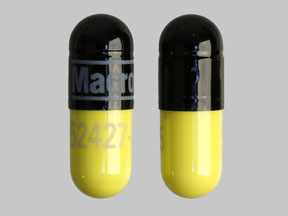
Macrobid Coupons & Savings Card – Discount Prices from $10.30
Brand for: Nitrofurantoin monohyd macro
My prescription
Edit
100MG, Nitrofurantoin Monohyd Macro (14 Capsules)
Select pharmacy

CVS
$20.04
COUPON PRICE
Walmart
$10.30
COUPON PRICE
Walgreens
$13.12
COUPON PRICE
Albertsons
$18.84
COUPON PRICEMacrobid savings card
Show this card to your pharmacist
Walmart
$10.30
BIN
ID
PCN
GRP
019876
LH43EEB31A
CHIPPO
LHX
Powered by
Related nitrofuran antibiotics prescriptions
More prescriptions for urinary tract infection
Related nitrofuran antibiotics prescriptions
More prescriptions for urinary tract infection
Macrobid (Nitrofurantoin Monohyd Macro) dosage forms
Dosage Quantity Price from Per unit 100MG 14 Capsules $10.30 $0.74 100MG 1 Capsule $3.06 $3.06 100MG 2 Capsules $3.61 $1.80 100MG 6 Capsules $5.84 $0.97 100MG 10 Capsules $8.07 $0.81 100MG 20 Capsules $13.64 $0.68 100MG 28 Capsules $17.23 $0.61 100MG 30 Capsules $17.82 $0.59 100MG 40 Capsules $20.76 $0.52 100MG 50 Capsules $23.70 $0.47
| Dosage | Quantity | Price from | Per unit |
|---|---|---|---|
| 100MG | 14 Capsules | $10.30 | $0.74 |
| 100MG | 1 Capsule | $3.06 | $3.06 |
| 100MG | 2 Capsules | $3.61 | $1.80 |
| 100MG | 6 Capsules | $5.84 | $0.97 |
| 100MG | 10 Capsules | $8.07 | $0.81 |
| 100MG | 20 Capsules | $13.64 | $0.68 |
| 100MG | 28 Capsules | $17.23 | $0.61 |
| 100MG | 30 Capsules | $17.82 | $0.59 |
| 100MG | 40 Capsules | $20.76 | $0.52 |
| 100MG | 50 Capsules | $23.70 | $0.47 |
| 100MG | 60 Capsules | $25.76 | $0.43 |
| 100MG | 90 Capsules | $29.49 | $0.33 |
| 100MG | 98 Capsules | $30.48 | $0.31 |
| 100MG | 100 Capsules | $30.73 | $0.31 |
| 100MG | 500 Capsules | $88.45 | $0.18 |
| 100MG | 1000 Capsules | $150.60 | $0.15 |
What is Macrobid used to treat?
Macrobid is used to treat urinary tract infections (UTIs).
What bacteria is killed by Macrobid?
Macrobid, which contains the active ingredient nitrofurantoin, is effective against several types of bacteria, primarily those that cause urinary tract infections. It is particularly effective against Escherichia coli, Enterococcus, Staphylococcus saprophyticus, and some strains of Klebsiella and Enterobacter.
What are the most common side effects of Macrobid?
The most common side effects of Macrobid (nitrofurantoin) include nausea, headache, and diarrhea. Some individuals may also experience dizziness, drowsiness, or a mild rash. If any side effects persist or worsen, it is important to consult a healthcare professional.
Can Macrobid make you feel unwell?
Yes, Macrobid (nitrofurantoin) can cause some individuals to feel unwell. Common side effects include nausea, headache, dizziness, and fatigue. If these symptoms are severe or persistent, it is advisable to consult a healthcare professional.
What types of infections does Macrobid treat?
Macrobid is primarily used to treat urinary tract infections (UTIs) caused by certain bacteria. It is not effective for other types of infections.
